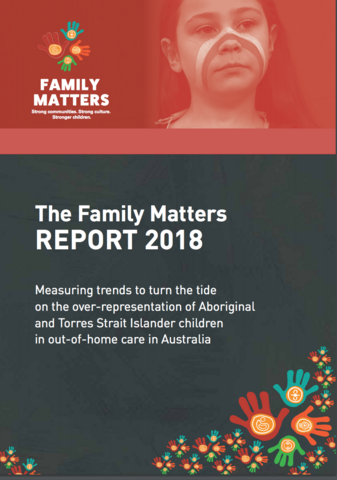The rate at which Aboriginal and Torres Strait Islander children are being removed from their families is an escalating national crisis. The Family Matters Report 2018, which is being released at the Healing Our Spirit Worldwide Conference in Sydney today, finds that Aboriginal and Torres Strait Islander children are now 10.1 times more likely to be removed from their families than non-Indigenous children. And the rate is projected to triple in the next twenty years if urgent action is not taken.
Fewer than half of Aboriginal and Torres Strait Islander children are placed with Aboriginal and Torres Strait Islander carers, following a steep decline over the last 10 years. This places Aboriginal and Torres Strait Islander children who are removed from their families at serious risk of being permanently disconnected from their families, communities and cultures.
The Family Matters Report 2018 points to a number of issues as the drivers of over-representation of Aboriginal and Torres Strait Islander children in the child protection system. Poverty is one – it was found that 25 per cent of clients accessing homelessness services were Aboriginal and/or Torres Strait Islander people, and most disturbingly, of those clients, one in four was a child under the age of 10.
Family violence was also highlighted in the report, where in 2016-17, emotional abuse, which can include exposure to family violence, was the most common child protection concern for Aboriginal and Torres Strait Islander children.
Another driver of over-representation is intergenerational trauma. Direct descendants of the Stolen Generations are 30 per cent more likely to have poor mental health than other Aboriginal and Torres Strait Islander people. All of these factors put our children at greater risk of entering the child protection system.
The report also notes with concern the strong trends in policy and legislative reform to increase the focus on permanent care and adoption. The recently released report from the Senate Inquiry into Local Adoption recommends pathways to open adoption for all children in out-of-home care, which will disproportionately impact Aboriginal and Torres Strait Islander children. As recognised in the ALP’s dissenting report this “willfully ignores the weight of evidence from submitters, it also flies in the face of human rights conventions”. Safety for Aboriginal and Torres Strait Islander children is always the priority and this includes ensuring their connection to culture, community and kin, as recognised in the Family Matters Report.
This year’s report is solutions-focussed, highlighting the way forward for positive change. We must shift from being reactive to being proactive, invest heavily in solutions, and involve Aboriginal and Torres Strait Islander people in decision-making about their own children.
Governments are only investing 17% of child protection funding in support services for children and their families, which are critical to preventing the situations that lead to child removals. The majority of child protection funding (83%) is spent on child protection services and out-of-home care – reacting to problems once they’ve already occurred. There must be a significant boost in funding of culturally safe preventative and early intervention measures to urgently put a stop to these high rates of Aboriginal and Torres Strait Islander child removals.
But, the pace of investment and action in prevention and early intervention is slow. Efforts to address broader community and social issues that contribute to risk for our children across areas such as housing, justice, violence and poverty, remain vastly inadequate and lack coordination… This year’s Family Matters Report puts a spotlight on primary prevention measures in the early years of children’s lives – the years that matter most to changing the storyline for our families.”
– Natalie Lewis, Chair of Family Matters
Another way forward is putting greater focus on early years services to ensure that our children have the best possible start in life. Aboriginal and Torres Strait Islander five-year-olds are 2.5 times more likely to be developmentally delayed than non-Indigenous children. And yet they are accessing early childhood education and care at half the rate of non-Indigenous children. We must facilitate greater access for Aboriginal and Torres Strait Islander children and their families to early years services.
The Family Matters Report 2018 also highlights the importance of Aboriginal and Torres Strait Islander decision-making in child protection. So far only Victoria and Queensland have a statewide program to support Aboriginal families to participate in child protection decisions. Only the same two states have agreed on a comprehensive strategy to improve outcomes for children that is overseen by Aboriginal and Torres Strait Islander representatives. Aboriginal and Torres Strait Islander family-led decision-making in child protection must be rolled out nation-wide to ensure the best outcomes for our children.
Family Matters is Australia’s national campaign to ensure Aboriginal and Torres Strait Islander children and young people grow up safe and cared for in family, community and culture. The campaign is led by SNAICC – National Voice for our Children – the national peak body for Aboriginal and Torres Strait Islander children. Our goal is to eliminate the over-representation of Aboriginal and Torres Strait Islander children in out-of-home care by 2040.
At the launch of this Family Matters Report 2018, the campaign is calling upon the Council of Australian Governments to work in partnership with Aboriginal and Torres Strait Islander leaders and organisations across the country, to develop a generational Aboriginal and Torres Strait Islander children’s strategy to eliminate over-representation in out-of-home care and address the causes of child removals.
We call on all Australian Governments to work with Aboriginal and Torres Strait Islander communities and their representatives over the coming year and beyond to implement the evidence based strategies for change that this report shows are desperately needed. We hope that, as a result, next year’s report will show a changing story. The choices that we make now go to the very heart of our shared obligation to heal our nation’s fractured past and secure our children’s future.”
– Natalie Lewis, Chair of Family Matters

